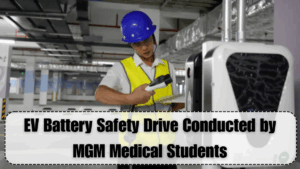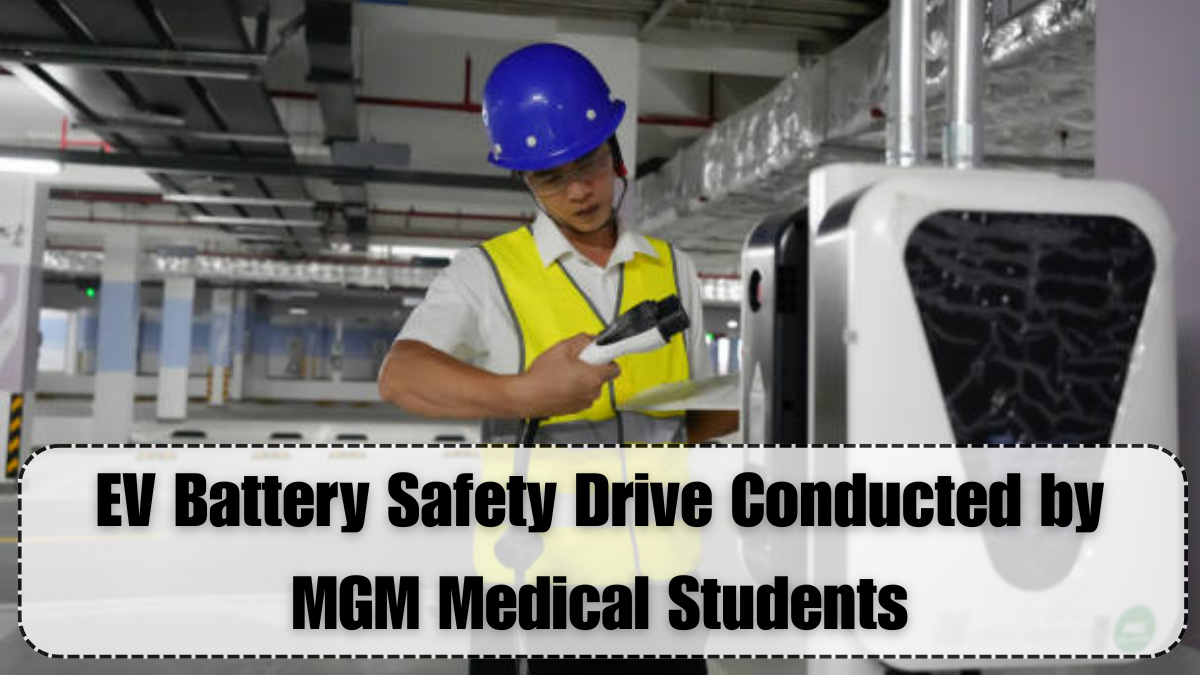EV health awareness drive initiatives are gaining momentum across India, and MGM Medical College, Nerul, has taken the lead by organizing a city-wide campaign focused on battery safety and electric vehicle education. With electric vehicles becoming an integral part of urban mobility, the risks associated with improper battery handling and disposal are growing. To combat this, MGM medical students conducted a hands-on awareness program educating the public about EV safety and toxic exposure risks.
The initiative was rolled out in multiple phases across Navi Mumbai, involving street plays, school sessions, community workshops, and live demonstrations. Medical students teamed up with local EV vendors and waste management professionals to explain the dangers of mishandling EV batteries and the long-term impact of toxic battery leakage on public health and the environment.

Why Battery Safety Awareness Matters Now
Lithium-ion batteries, widely used in EVs, can pose serious risks if not disposed of correctly. MGM’s EV health awareness drive focused on debunking myths around battery safety and educating common users about real-world practices. Many participants were unaware that punctured or overheated batteries could lead to chemical leaks, respiratory hazards, or even fires.
Key topics covered during the campaign included:
-
Safe storage and transportation of EV batteries
-
Identifying signs of battery swelling or overheating
-
First aid response for toxic exposure
-
Safe drop-off points for used EV batteries
-
Role of EV safety protocols during vehicle breakdowns
The campaign was designed to be interactive and included quizzes, posters, and mock drills for quick learning and retention.
Empowering Communities Through Medical Outreach
What made this awareness drive stand out was its medical leadership. MGM students used their academic knowledge to translate complex chemical reactions into simple everyday language. From auto-rickshaw drivers to senior citizens, the students reached out to over 2,000 people in just three days of outreach.
Their training sessions emphasized:
-
Human health impact of battery acid leaks
-
Long-term neurological issues caused by toxic battery fumes
-
Proper methods of handling discarded battery units at home
-
Emergency response in case of accidental exposure
This EV health awareness drive demonstrated that medical colleges can play a powerful role in environmental and technological literacy.
Collaboration with Local Stakeholders
The students collaborated with local RTO officials, environmental agencies, and e-waste collection units. Charging station operators also participated in spreading awareness on handling live terminals and preventing electrical mishaps. The goal was to create a united front where education, enforcement, and infrastructure work together to promote EV safety.
Each location of the drive had a display booth with:
-
Sample damaged and safe battery cells
-
First-aid kits for exposure events
-
Flyers in regional languages
-
Contact details of certified battery recyclers
This holistic approach helped bridge the knowledge gap between electric mobility growth and public health preparedness.
Institutional Impact and Future Expansion
MGM Nerul has now integrated the campaign’s results into its ongoing public health curriculum. The EV health awareness drive has been documented and submitted to the state education board as a model for replication across Maharashtra. The success of the initiative is encouraging other institutions to consider similar student-led campaigns on environmental topics.
By stepping beyond classrooms and clinics, MGM’s future medical professionals are shaping themselves into socially responsible leaders who understand the intersection between modern technology and community well-being.
FAQs
What is the focus of MGM Nerul’s EV health awareness drive?
The campaign focused on battery safety, toxic exposure risks, and promoting public understanding of EV safety protocols.
Who conducted the awareness campaign?
Final-year medical students from MGM Nerul led the initiative with support from EV industry partners and environmental officers.
What topics were covered in the awareness program?
The drive covered toxic battery handling, first aid response, battery disposal safety, and personal protection from chemical exposure.
Was the campaign open to the general public?
Yes, the EV health awareness drive reached schools, market areas, parking lots, and residential zones to educate a wide demographic.
Will this campaign be repeated in other cities?
While this event was specific to Navi Mumbai, it has been proposed to the Maharashtra education board as a replicable model for other regions.
Click here to know more.




